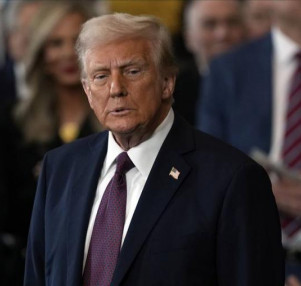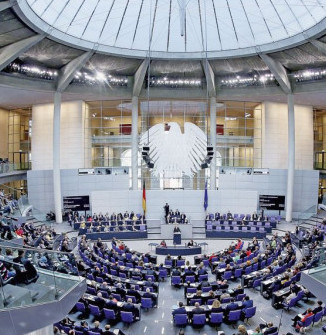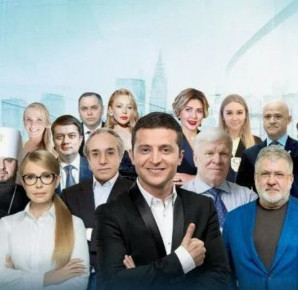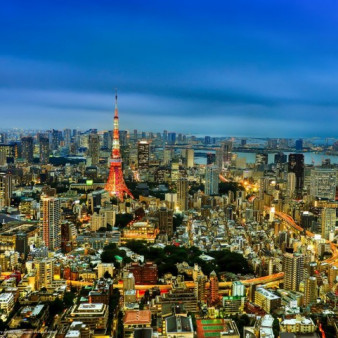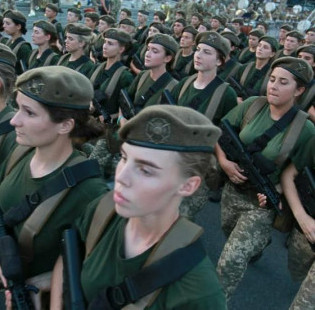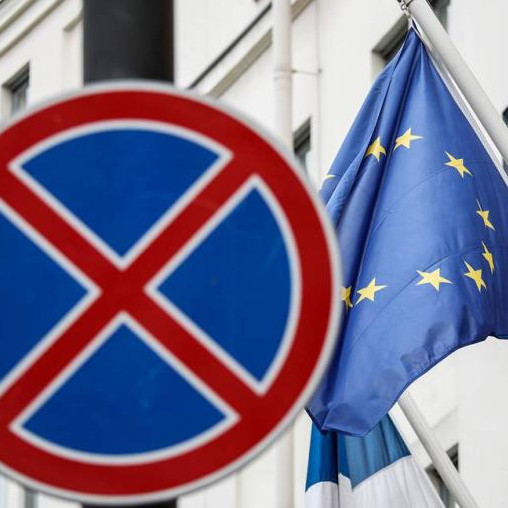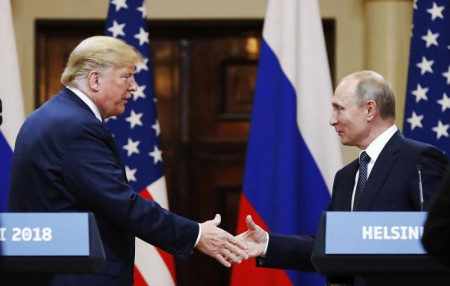
Saudi Arabia could host a meeting between Russian President Vladimir Putin and US President Donald Trump; the Munich Security Conference commences in Germany focusing on the resolution of the conflict in Eastern Europe; and Russia is seeking to find alternative logistics hubs in Africa. These stories topped Friday’s newspaper headlines across Russia, according to TASS News Agency.
Izvestia: Why Saudi Arabia can host Putin and Trump talks
A meeting between Russian President Vladimir Putin and his American counterpart Donald Trump could take place in Saudi Arabia, which is increasingly positioning itself as a center of international diplomacy. It was this nation that the new head of the White House named as a venue for future talks after a telephone conversation with the Russian leader. Riyadh has already played an important role in the prisoner swap between the United States and Russia and previously hosted a summit on Ukraine. Thanks to strong ties with both sides and the ability to ensure the confidentiality of negotiations, the Kingdom is becoming a convenient platform for dialogue between world leaders, experts told Izvestia.
"This nation has strong political and economic relations and growing interests with friends in Russia and the United States, and enjoys great trust from global powers. In addition, Saudi Arabia has extensive experience in resolving historical conflicts," Saudi political scientist Mubarak Al-Aati told Izvestia.
Donald Trump established close relations with Riyadh during his presidency. Saudi Arabia was the first country he visited during his foreign tour, and Trump also approved major arms deals with the kingdom.
"Trump must show Washington’s willingness to use the kingdom as an important gateway for its interests, not only in the region but also beyond, thereby underscoring Riyadh’s global role. Such a step fits into the logic of deepening the strategic partnership between the United States and Saudi Arabia," orientalist Leonid Tsukanov told Izvestia. According to the expert, the choice of Saudi Arabia against the background of other Gulf countries is also due to the fact that this state has maintained neutrality for a long time and has not been involved in the Ukrainian conflict.
"The Kingdom has practiced positive neutrality in many disputes, especially between the two superpowers, Russia and the United States. It enjoys the trust of the Ukrainians and has excellent economic relations with them. Riyadh has provided humanitarian aid to Kiev in the amount of over $400 mln. All this has made Saudi Arabia an anticipated venue for negotiations and a reliable mediator for all parties," Mubarak Al-Aati believes.
"Although Saudi Arabia remains a regional ally of the United States, it tries to remain neutral on a number of issues, including the Ukrainian conflict. Over the three years of the special military operation, the Kingdom has not made critical statements about Moscow and has not participated in direct arms supplies to Kiev," Leonid Tsukanov told Izvestia.
Riyadh is generally open to dialogue with both Moscow and Washington, which is reflected in the frequency of contacts between the governments. Of course, the US policy is expectedly dominant in Riyadh’s policy, but the Kingdom reserves the possibility of interacting with Russia through humanitarian and trade channels, the expert summarized. Besides, the United States, Russia, and the Kingdom of Saudi Arabia are the three biggest players on the oil market. The likely meeting between Trump and Putin in Riyadh could include not only political issues but also discussions on energy matters, in which Saudi Arabia plays a key role.
Izvestia: Munich Security Conference returns to discuss security in Europe
The 61st Munich Security Conference kicks off in Germany, with the central topic being the settlement of the conflict in Eastern Europe. At the same time, this year’s dialogue will take place in a new context: not only has power changed hands in the United States, but Moscow and Washington have managed to establish their first communication, Izvestia writes. The telephone conversation between the presidents of the two countries took place on February 12, and now contacts between representatives of Russia and the United States in Munich are also possible. A meeting between Vladimir Zelensky and representatives of the new US administration, including J.D. Vance and Marco Rubio, is also expected there.
According to Trump’s statement, on February 14, representatives of Russia and the United States will hold discussions at the Munich Conference on the settlement of the Ukrainian conflict. Although earlier it was assumed that Russia was not invited to the event.
"Trump’s classic approach - an invitation to dialogue from a position of strength, which he boldly used against traditional allies - was set aside. This may indicate that Trump sees Putin as an equal dialogue partner and that there is interpersonal ‘chemistry’ between the two leaders. In addition, Trump wants to quickly announce his success, that is, the resolution of the conflict, which he promised before coming to power, and move on to something more important, for example, focus on China," Tigran Meloyan, an analyst at the HSE Center for Mediterranean Studies, told Izvestia.
It is expected that Washington will make it clear to Kiev that security assurances for Ukraine should be provided primarily by European states. Trump has repeatedly complained that the EU and the UK are not investing enough in helping Kiev. It is possible that NATO members will be asked to increase their defense spending and stop relying on the billions of dollars that the United States has been injecting into the North Atlantic Alliance’s budget.
Europe now looks like the losing party, Tigran Meloyan believes. "They understood, but did not want to admit until the last minute, that the risk of Trump’s return to power could lead to a resumption of dialogue with Russia, in which the EU’s interests might not be taken into account. In fact, this is largely what is happening: there was no place for the EU at the negotiating table, and Trump and Putin began discussing a new European security framework in which Russia will have a say and Europe will have to accept it," he told the newspaper.
The problem now is that there is no longer a "Western" understanding of security - there is a European and an American one, head of the Laboratory for Political Geography and Contemporary Geopolitics at the Higher School of Economics Dmitry Novikov believes. Europe is trying to somehow resist US pressure, but it is obvious that the essence of the US position is that Europeans should pay for European security. Even if the negotiations fail and Ukraine continues to be supported, it will be with European money, the expert told Izvestia. At the same time, a logical question arises: do the EU countries and the United Kingdom have enough resources to support Ukraine in its confrontation with Russia without the United States?
Nezavisimaya Gazeta: Moscow is looking to create logistics hub in Africa
The Kremlin did not disclose whether Russian President Vladimir Putin discussed the fate of Russian military bases with Syria’s interim leader Ahmad al-Sharaa during their first telephone conversation. Such assumptions appeared after the administration in Damascus published its statement on the results of the conversation and spoke about Moscow’s alleged readiness to review the agreements with the previous government of Syria. At the same time, Russia is still trying to diversify its options and find a new ally for its military presence, Nezavisimaya Gazeta writes.
Putin and al-Sharaa reportedly held a "constructive, businesslike, and significant" telephone conversation, which showed that the countries continue to negotiate the parameters of the Russian military presence, despite the apparent contradictions.
However, despite the fact that Damascus has shown flexibility in its contacts, Moscow is still looking for other options for its military presence in the region and beyond. The day before, Sudanese Foreign Minister Ali Youssef Ahmed Al-Sharif declared that an agreement had been reached with Russia on the deployment of its naval base on the territory of the African state.
"President Vladimir Putin’s conversation with Ahmed al-Sharaa took place against the backdrop of the latter’s numerous contacts, including, for example, with Egyptian President Abdel Fattah el-Sisi, who supports the Assad regime," Anton Mardasov, an expert on the Middle East, told Nezavisimaya Gazeta.
According to the expert, the main subject of negotiations between Moscow and Damascus is the Russian facilities in Tartus and Latakia. "They can be used as entry points for cargo transit and ship repairs en route to Africa, taking into account direct sea and air links with Libya or Guinea for the transfer of cargo to the countries of the Sahel Alliance," Mardasov said. "Of course, safety options are necessary. That is why the modernization of a number of facilities in Libya is continuing. Negotiations are under way with Sudan on the economic involvement of Russian companies. Agreements with Oman and a return to efficient transit through Tunisia are possible," he added.
However, transport logistics around Syrian facilities have long been established, the expert emphasized. "In this sense, Moscow’s actions are understandable and logical, especially since the countries’ negotiations took place against the backdrop of a long pause in US-Syrian contacts," he added. "It is quite obvious that the dialogue with Moscow is extremely difficult to build, not only because Syria, one way or another, uses the factor of Russian bases to bargain with Europe on the lifting of sanctions, but also because after the fall of the previous government, Assad’s family and several hundred high-ranking military and intelligence officials of his regime were taken to Russia," the expert concluded.
Nezavisimaya Gazeta: How much will Taiwan support cost US president
Taiwan will pay the United States $761 mln for surface-to-air missile systems, which are expected to shield Taipei and key infrastructure from a potential attack by China’s People’s Liberation Army. The deal was approved by former US President Joe Biden in October 2024, but is formally the first agreement under the Donald Trump administration. The treaty must be executed by the end of 2030. Experts believe that the White House will not make any definitive commitments on the island’s protection in the event of a conflict, maintaining an unclear approach as under Biden, Nezavisimaya Gazeta writes.
There is no uncertainty in the treaty itself. It was signed in Washington by Taiwan’s military mission and the American Institute of Taiwan, an institution that effectively replaces the US embassy due to the lack of diplomatic relations between the US and the island.
The South China Morning Post, a Hong Kong-based newspaper, links the missile deal to Washington’s decision to stop providing aid to other countries through the USAID agency (considered unwelcome in Russia). The paper quoted Lin Yi-Chun, an opposition politician in the island’s parliament, as saying that any reduction in American aid would further weaken Taiwan’s fragile status on the international stage. As a result, the ruling Democratic Progressive Party government will have to change its approach to both China and the US under increasing pressure from Beijing.
On January 24, the US State Department issued an order to freeze almost all foreign aid for 90 days to determine the extent to which such foreign assistance aligns with President Trump’s foreign policy. The only categories that will escape the freeze are urgent food aid and funding for military assistance to Israel and Egypt. No concessions will be made to key US security partners such as Ukraine and Taiwan.
Alexander Lomanov, Deputy Director of the Institute of World Economy and International Relations, told Nezavisimaya Gazeta, "The general direction of US-China relations cannot change for the better. Trump will continue the ‘ambiguity’ policy pursued by Biden. That is, Biden said he recognized Taiwan as part of China, but he provided Taiwan with weapons. Trump is determined to compete with China, to wage a trade war. His tariffs and sanctions will not work. Then he may try to resort to military and political pressure. This is where the danger of conflict lies."
Alexander Lukin, Deputy Director of the Institute of China and Contemporary Asia at the Russian Academy of Sciences, believes that the Republicans are more aggressive on China than the Democrats. "Therefore, Washington will increase its support for Taiwan," he told Nezavisimaya Gazeta.
Vedomosti: Russian ruble strengthens amid expected resolution to Ukrainian conflict
The US dollar exchange rate has dropped almost 5 rubles in just two days. The Bank of Russia set the official exchange rate for February 14 at 91.03 rubles per dollar, 3.02 rubles lower than the previous day. This is the lowest level since September 2024. The day before, the rate fell by 1.75 rubles to 94.05 rubles per dollar. Compared to the local high on February 4 at 99.94 rubles per dollar, by February 14 the rate fell by 8.9%. According to Vedomosti, anticipations of a resolution to the conflict in Ukraine have sparked optimism in Russian markets.
The dollar exchange rate on the Russian interbank market even dropped below 90 rubles for the first time since September 13, according to data from the Finam platform. The ruble is also strengthening on the international Forex market, according to data from the ICE exchange.
According to experts, the news sentiment was the reason for the strengthening of the Russian currency. A significant and sustained strengthening of the ruble is linked to the activity of speculative capital amidst positive news forecasting a decline in geopolitical costs, managing expert of the PSB Analytics and Expertise Center Denis Popov told the newspaper. Traditionally, any improvement in the geopolitical situation leads to a strengthening of the ruble and growth in Russian stocks and bonds, as investors reduce their assessment of the geopolitical risk premium for holding ruble assets, Chief Analyst at Sovcombank Mikhail Vasiliev agreed. Expectations of an influx of foreign capital into the Russian market are also growing, he added.
A reduction in international tensions may lead to expectations of a gradual lifting of at least some of the sanctions, which may improve the situation with foreign trade, analyst at Finam Alexander Potavin believes.
In the coming days, the stock market and the ruble may continue to increase on expectations of improved relations between Russia and the US, Vasiliev believes. At the end of February, the ruble will receive support due to the tax period, when exporters will be more active in selling foreign currency earnings for payments with the state, the expert added.
TASS is not responsible for the material quoted in these press reviews
